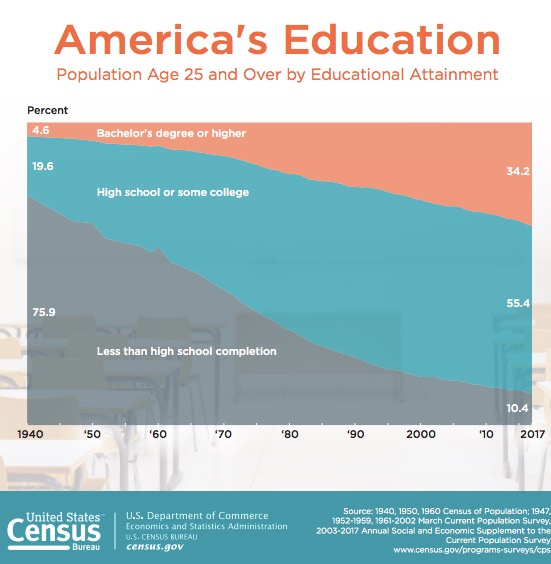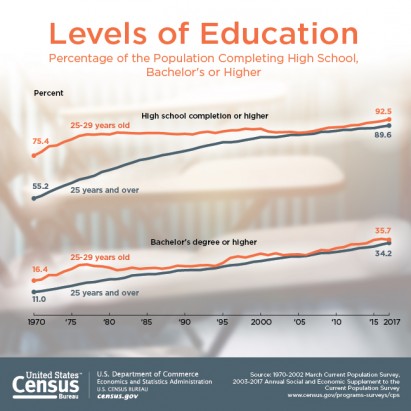Reference: High School Completion Rate is Highest in U.S. History According to New U.S. Census Data
New data released today by the U.S. Census.
From the News Release:
For the first time in U.S. history, 90 percent of the population age 25 and older have completed high school. This is according to new Educational Attainment data released today from the U.S. Census Bureau.
“In 1940, less than half of the population age 25 and older had a high school diploma. Over the years this has increased to the point where we now have 90 percent who have completed high school,” said Kurt Bauman, a demographer in the Social, Economic and Housing Statistics division. “That means out of the 217 million people age 25 and older
Between 2000 and 2017, the percentage of all people age 25 and older who had not completed high school decreased by more than one-third, dropping from 16 percent to 10 percent.
As high school educational attainment increased for the nation as a whole, attainment for minority populations also increased. Over the same time period, the percentage of blacks age 25 and older who had completed high school increased by 9 percentage points from 78 percent to 87 percent. The percentage of Hispanics age 25 and older who had completed high school increased by approximately 13 percentage points from 57 percent to 71 percent in the same time period. Non-Hispanic whites increased their high school completion 6 percentage points, from 88 percent to 94 percent.
Additionally, the increase in educational attainment goes beyond high school. The rate of attainment for a bachelor’s degree or higher increased from about 26 percent in 2000 to approximately 34 percent in 2017, an increase of 9 percentage points. Attainment of a bachelor’s degree or higher was greater for females age 25 and older (35 percent) than it was for males (34 percent). Of females between the ages of 25 and 34, 41 percent had attained a bachelor’s degree or higher.
More Highlights
- Asians were most likely to have at least a bachelor’s degree, with a rate of 55 percent for those age 25 and older. Among non-Hispanic whites, the rate was 38 percent. Among blacks, the rate was 24 percent.
- Since 2000, the number of master’s degree holders has doubled to 21 million and the number of doctoral degree holders has doubled to 4 million.
- Among Hispanics of any race group age 25 and older, 17 percent had a bachelor’s degree or higher.
- People with advanced degrees make up 13 percent of all U.S. adults, the percentage of the population that had a bachelor’s degree or higher in 1973.
- In 2017, 14 percent of immigrants to the United States held master’s, professional and doctoral degrees as compared to 13 percent of U.S. natives.
- College attainment of the population age 55 and older grew from 19 percent in 2000 to 30 percent in 2017. Part of this is accounted for by the aging of the baby-boom generation, which now makes up 70 percent of the population age 55 and older.
- From 2010 to 2016, mean earnings for workers with less than a high school education grew by 21 percent to $27,800. Other levels of education also saw increases in their earnings between 2010 and 2016. Earnings in 2016 for workers with a high school diploma or equivalent was $36,700, workers with a bachelor’s degree earned $67,300, and advanced degree holders earned $95,200.
Direct to New Educational Attainment Data
See Also: Immigrant Families and Educational Attainment (via U.S. Census; March 30, 2017)
Filed under: Data Files, News
About Gary Price
Gary Price (gprice@gmail.com) is a librarian, writer, consultant, and frequent conference speaker based in the Washington D.C. metro area. He earned his MLIS degree from Wayne State University in Detroit. Price has won several awards including the SLA Innovations in Technology Award and Alumnus of the Year from the Wayne St. University Library and Information Science Program. From 2006-2009 he was Director of Online Information Services at Ask.com.




